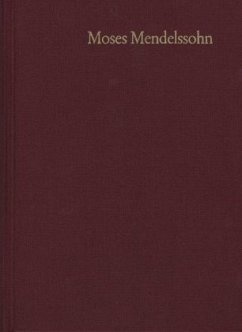The annotations which accompany the German translation of the 'Biur' reveal the close association between this Hebrew commentary and the tradition of Jewish interpretation of the Bible. Proof of the literary sources make Mendelssohn's compositional technique transparent and shed light on his exegetical arguments. In addition to quotes from Talmud and Midrash, connections are revealed to exegesis in the Middle Ages and the Renaissance, to Christian Hebraic studies and historical-critical biblical studies as well as to the knowledge of natural sciences in the 18th century. In the process, Yiddish and German translations of the Bible from Luther to the Christian scholars of the 18th century have been incorporated. The commentary also calls attention to links to Mendelssohn's philosophical works.
»Der Kommentar bietet [...] das gesamte editorische Material zu den Pentateuchkommentaren Mendelssohns, einschließlich einer Erörterung der Verfasserschaftsfrage. Die Edition bzw. der Kommentar bewegen sich auf einem hohen Niveau und stellen ein höchst erfreuliches Resultat der Beschäftigung mit dem jüdischen Religionsdenken und der Aufklärung dar.« Till Kinzel, Informationsmittel für Bibliotheken (Jahrgang 24, Heft 4) »Es ist Wenzels Verdienst, den nachgerade polyhistorischen Aufwand dieses hermeneutischen Unternehmens lückenlos erschlossen und erschöpfend kommentiert zu haben. Mit diesem Band steht den Religions-, Literatur- und Kulturwissenschaften, den Jewish Studies und der Philosophie ein wertvollen, ja unverzichtbares Instrument zur weiteren Erforschung der Haskala zur Verfügung.« Cord-Friedrich Berghahn, Germanistik
